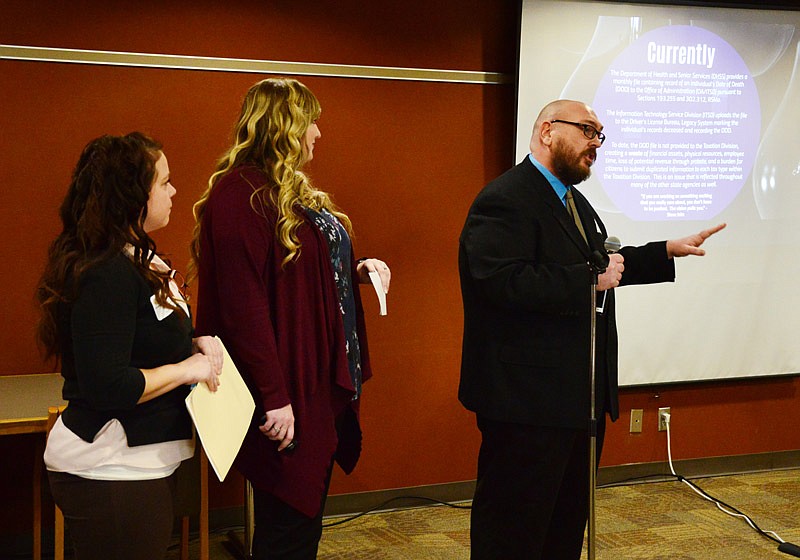Asked if they knew of any ways to improve service to the state's residents, Missouri's state employees came up with ideas - a lot of ideas.
The Show Me Challenge asked state personnel in the executive branch to pitch their ideas to provide solutions to hurdles they and residents face, cut out the bureaucracy and save money. Within weeks, about 90 teams had each developed a proposal they thought would benefit the state and its residents.
A selection committee reviewed the pitches and narrowed the pool to 11 finalists. In a process similar to the television show "Shark Tank," those finalists were given five minutes each to pitch their ideas to a five-member senior leadership selection committee, who were to compare notes and make a selection of the winning pitch. The winners will possibly be announced today.
Each member of the winning team is to receive $500, senior support and mentorship to translate their proposals into results.
Anna Hui, director of the Department of Labor and Industrial Relations and a member of the panel of judges, said the idea of Show Me Challenge was a terrific motivator for teams who may have had a lot of great ideas "percolating in their minds."
Making the pitches could give them a sense of what it takes to have an idea and put it forward, she said.
"A lot of good thought has gone into the pitches. Not only is it something that's going to help them and their immediate work colleagues, but is something that could be more broadly used across state government," Hui said.
Gov. Mike Parson and the cabinet are demonstrating they really care about what front-line staff are thinking, she said.
"We care about what rank-and-file folks throughout the organization are concerned about," she said. "And we all know that people want to show up for work every day and do a good job."
Many of the finalists' proposals focused on communication within state government and with Missouri's residents. Some focused on streamlining the bureaucracy residents find themselves wading through when trying to complete the simplest tasks for themselves and their businesses.
Team AgStop proposed a web portal and accompanying smartphone application - focused on agricultural needs - that would allow farm owners to page through a short list of prompts to submit regulatory forms, identify new marketing opportunities and discover financial options available to them through the Missouri Department of Agriculture. All those options would be available on one site or their apps.
Sami Jo Freeman, public information administrator for agriculture, was a presenter for AgStop.
"We've never been able to get this many people together from several agencies to help solve common problems," Freeman said. "We've been working our tails off to try to perfect the pitch in the hopes that one day this will benefit the citizens of Missouri."
The idea, she said, was to streamline the resident experience, so they can get everything in one portal.
"We had this idea on the back burner for a while, but we really didn't know how to solve it. So, when the Show Me Challenge came along, we had the opportunity to get everyone together."
The idea is "Pie in the Sky" to begin with, Freeman said. It started with the thought of simply an app. However, to reach as many people as possible, it became clear they should begin with a web portal and transition to the app.
During the pitch, team members said there are 99,171 farms in Missouri. And, the cost to develop the app could be $20,000-$100,000.
Team members said they are focused on "building the bones" of AgStop.
Team Boil Advisories proposed building an interactive statewide web-based boil advisory and low-pressure event reporting program.
The Connecting Opioid Response Efforts team pitched creating program-level work groups to facilitate opioid response information sharing within and across state agencies.
Team leaders hope to branch out their work groups to other state departments, said Tara McKinney, the viral hepatitis coordinator for Health and Senior Services.
The state is already doing great work on the opioid epidemic, McKinney said. However, this will allow program staff to form partnerships with other programs.
"A couple of our goals are to reduce redundancy and maximize resources," said Whitney Coffey, a research analyst with the Bureau of Health Care Analysis and Data Dissemination. "Program-level folks who are working with this response effort every day are talking to each other and sharing resources and opportunities."
Just within the Division of Public Health, there are more than two dozen programs addressing opioid response efforts, the women said.
"It seems impossible that people from 24 (programs) are working as collaboratively as they could," Coffey said. "So, we hope this will increase that effective communication so all those great ideas are getting shared and utilized to their greatest potential."
Team Keep On Truckin' is focused on reducing commercial driver license transaction errors that occur within license offices. Team LIVE Chat would initiate a feature throughout government agencies to allow residents to directly communicate with agency staff. LIVE Chat members would initiate a program like that in Indiana and other states. The program, they said, would sharply reduce time spent on the phone resolving issues.
Other pitches would restructure data storage so more agencies can share and analyze it, improve state agency coordination regarding asbestos information, offer mobile assessments, reform Missouri HealthNet, help the state's employees reach optimal mental fitness and create a statewide mortality data exchange.
Drew Erdmann, the state's chief operations officer and another panelist, said about 350 people from across the state participated in the competition. Another competition will begin again shortly, he said, and culminate in June.
"We're trying to generate grassroots interest," Erdmann said. "Folks are saying, 'We can make our lives better by changing how we serve our citizens or cut through bureaucratic processes.' Who better to do that than the people who are doing it on the front lines."

